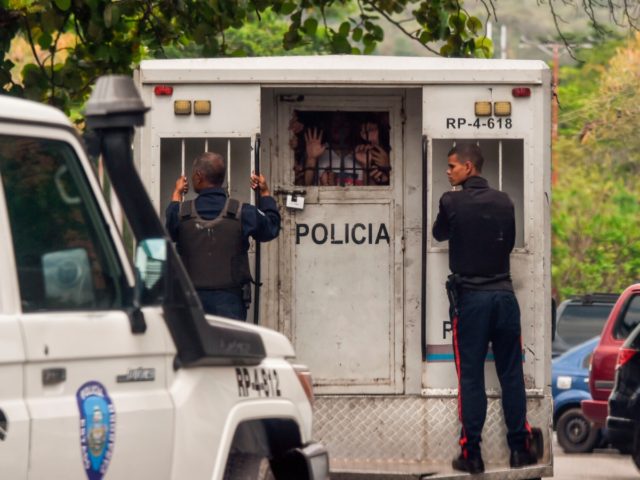Venezuelan newspaper El Nacional revealed on Wednesday the confirmation of four cases of Chinese coronavirus among workers at the Helicoide, a former shopping mall turned into the nation’s most notorious prison for political dissidents.
The Helicoide is officially the headquarters of the Bolivarian National Intelligence Service (Sebin), which dictator Nicolás Maduro has used since his ascent to power in 2013 to intimidate, imprison, torture, and kill dissidents against his socialist regime. The Sebin uses the prison to keep high-profile political dissidents behind bars. Survivors of the Helicoide say they endured torture in the form of beatings, sleep deprivation, forced uncomfortable positioning, and crucifixion.
According to El Nacional, the four identified coronavirus cases at the Helicoide are all Sebin motorcycle agents, not political prisoners – three women and one man. There is no evidence that the Maduro regime would use its limited supply of coronavirus testing kits to monitor the health of political prisoners. Those testing positive were reportedly symptomatic before receiving the test.
The Chinese coronavirus often infects a person without presenting symptoms and may be contagious even in people who do not know they have it. In those who do present symptoms, the virus causes difficulty breathing, coughing, fever, and body aches. When the infection escalates, it causes pneumonia and death.
El Nacional noted that the Maduro regime has not confirmed the four cases publicly and appears to be planning not to reveal them at all. The newspaper’s unnamed source inside the government told reporters, “they are scared, they don’t want it to be known.”
The four patients were reportedly taken secretly to a medical facility for regime elites to receive treatment. Venezuela does not have a functional healthcare system after two decades of socialist health care. Venezuelan hospitals for years have lacked nearly every medicine necessary to function, from pricey cancer drugs to birth control to ibuprofen, and face severe shortages of bed and sanitary supplies like soap and water. Maduro does maintain a small number of facilities in Caracas for the socialist elite, however, where presumably the Sebin officers are receiving treatment.
The Maduro regime – which does not legitimately rule Venezuela but, through its control of the military and security agencies like Sebin, maintains a grip on power – claims it has confirmed 36 cases of Chinese coronavirus in the country, 30 of which are allegedly foreigners who entered the country while infected. While the Maduro regime maintains close ties to China and regularly accepts visits from Communist Party officials, it asserts that none of the known cases are Chinese citizens. Most of the known cases were documented in the Caracas area or in Miranda state, one of the country’s wealthiest and not far from the capital.
Advocates for the political prisoners trapped at the Helicoide have demanded Maduro free them, noting that the squalid conditions that they are forced to live in may exacerbate the spread of an outbreak within its walls. According to the Argentine outlet Infobae, human rights advocates had confirmed that Maduro has imprisoned over 300 people in response to public expressions of disagreement with his regime. Those at the Helicoide are forced into tiny cells with little access to drinking or bathing water and in close quarters with other prisoners. As Sebin keeps political prisoners largely hungry, dirty, and weak, they are also at higher risk of serious complications if they contract the virus.
“Political prisoners in Venezuela are at high risk after the confirmation of coronavirus cases at the Helicoide, where they keep hostage Roberto Marrero, Juan Requesens, and Luis Navas, among others,” the official Venezuelan ambassador to the United States, Carlos Vecchio, denounced, naming some of those trapped in the prison. Vecchio was appointed by the legitimate president of Venezuela, Juan Guaidó, who has failed to exercise any of his powers save for appointing representatives abroad.
“Their relatives have been very nervous about the situation. At the General Directory of Military Counter-Intelligence … north of Caracas, there is no fresh water,” Ana Leonor Acosta, an attorney representing political dissidents, said on Wednesday. “We understand that they said that they would take charge of handing out food, but we don’t know if that is true. In the Sebin’s Helicoide, there is no water. We are concerned that there is not enough medicine to treat them all.”
While political prisoners at the Helicoide languish with little chance at a humanitarian release, at a prison in Zulia state, common criminals simply staged a mass jailbreak on Wednesday. According to the Venezuelan outlet Runrunes, 84 inmates, eight of which were women, conspired to attack prison guards by shouting for help in the early morning hours of Wednesday, then assaulting the guards who responded and taking their weapons. In the ensuing melee, ten prisoners died and police recaptured six, meaning 68 inmates are still free.
The Maduro regime typically allows gang members and common criminals nearly total control of their prisons. In a particularly egregious display of this policy, a 2016 video smuggled out of a Venezuelan prison revealed gang members showing off a formidable firearms arsenal they kept for themselves inside the prison.
Socialist dictator Hugo Chávez banned the private ownership of firearms in 2012.

COMMENTS
Please let us know if you're having issues with commenting.